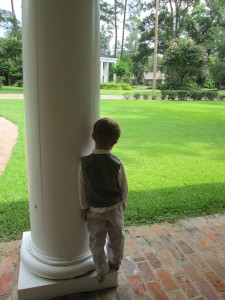In the South, our stories of who we are and who we belong to are as important as the blue skies above us. Our stories run through us, they become us, they make us proud of where we came from and where we are going. Our stories weave texture into our lives. Our stories strengthen us. Our stories help us survive.
Hugh’s story is not really his story. It is not mine and it is not his dad’s. Hugh’s story is more. Just like all our stories in our lives. It did not begin with us.
Hugh’s story began even before I was born, when my parents became friends with a young man who had Type 1 Diabetes while they were in seminary. They became such good friends that he was the minister at their wedding. They became such good friends that I grew up hearing about how he gave himself insulin injections and how his wife planned each and every meal. They became such good friends that I visited his house as a child and was curious to find out more about diabetes and how he could live his life under such strict conditions. His story was woven into mine.
Hugh’s story began when I was in elementary school and was in the same class as a little boy who had Type 1 Diabetes. I watched him leave class every afternoon to eat a snack in the cafeteria. I watched him grow with the rest of us. I watched how he was the same as everyone else. His story was woven into mine.
Hugh’s story began when I was on college and worked with a girl in our campus library who became very skinny one semester. She complained of never feeling good, always being thirsty, running to the bathroom all the time, and throwing up after she ate. She passed out one day in class. She was diagnosed with Type 1 Diabetes. Her story was woven into mine.
Hugh’s story began when his dad, Scott, started his career at a local bank. Scott became friends with a co-worker who had Type 1 Diabetes. Scott would come home telling me how his co-worker had something called an insulin pump, that looked like a beeper. Scott told me how his friend would have to be careful about what he ate when they went on business lunches. Scott told me how his friend was rushed to the emergency room one evening because he had accidentally mixed up his insulin dosage. His story was woven into mine.
I am telling you this because Hugh’s diagnosis day could have been very different, if not for these others who shared their story and their lives with us. If not for the girl I worked with in college, I would not have known the symptoms of Type 1 Diabetes. If not for my parents’ good friend, my mom would not have encouraged me to call the doctor when Hugh was first showing the signs of Type 1. If not for Scott’s co-worker, I would not have had the hope that young boys with Type 1 can grow into strong, confident, and capable men. If not for the little boy in my classroom in elementary school, I would not have known that Hugh could be the same as everyone else.
Their stories melted with my story that day. And I hope my story will melt into yours.
It will take some time to tell it. Like all our stories in the South, it is long and must be listened to slowly. Make yourself a cup of coffee or a glass of sweet tea – that’s the only way to listen to a story here. And please be patient with the story teller. Sometimes the lesson is not for the listener, but for the one telling the story.
To Be Continued . . .
